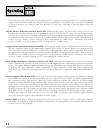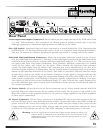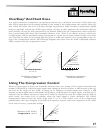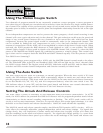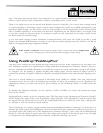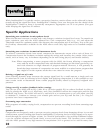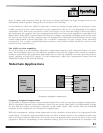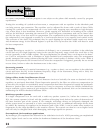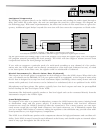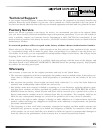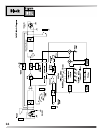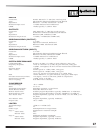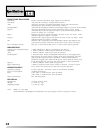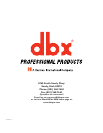
Anticipated Compression
By feeding the program directly to the 162SL's sidechain return and sending the audio signal through a
delay line before the audio input, the unit can anticipate the need for a gain change. See diagram on
the following page. With some experimentation, the effect can be that of zero attack time at a given fre-
quency. Additional signal delays beyond this zero time will then cause the compressor to finish reduc-
ing the gain before the leading edge of the loud passage even enters the signal input. This will suppress
the program material preceding this loud passage. The 162SL will then begin to release (recover from
compression) before the loud passage has ended.
If you wish to compress a particular track of a multi-track recording or one channel of a live perfor-
mance mix, the 162SL output can be directly connected to a line input jack (balanced or not), or wired
to an Insert point. In the latter case, the signals could be unbalanced or balanced.
Musical Instruments (i.e., Electric Guitar, Bass, Keyboards)
The output of an electric guitar is sometimes not hot enough to drive the 162SL's input. When this is the
case, you should use the PREAMP OUT of your guitar amp (if so equipped), or the output of some other
device that is designed to accept low-level instrument inputs (including various stomp boxes and rack
mount audio products). Such sources can be balanced or unbalanced; this is no problem for the 162SL.
Microphones and bass guitars, like guitars, typically have low-level outputs and must be pre-amplified
before feeding the line level inputs of the 162SL.
Instruments like keyboards typically produce a line-level signal and can be connected directly from the
instrument's output to the 162SL's input.
Sound Reinforcement
To compress a live mix or to protect loudspeakers, connect the 162SL between the source (mixing board
or distribution amp) and the power amp(s). If multi-way loudspeakers with low-level electronic
crossovers are used, the 162SL(s) should go after the crossover(s). For a stereo system, you can sepa-
rately stereo couple the two high band crossovers, low band crossovers, etc. If limitations require that
you use a single 162SL before a crossover, adding an equalizer to the sidechain may provide some addi-
tional protection to your high frequency components.
The 162SL is an all-solid-state product with components chosen for high performance and excellent reli-
ability. Each 162SL is tested, burned in and calibrated at the factory and should require no internal adjust-
ment of any type throughout the life of the unit.
23
Source
Device
(mixer)
Audio
Outputs
DELAY
162SL
Audio
Inputs
Audio
Outputs
Sidechain
Return
Sidechain
Send
Common “ducking” setup: delay is inserted into audio input,
non-delayed signal fed to sidechain. Sidechain triggers compression before signal is heard.



